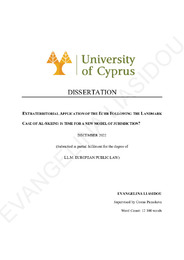Extraterritorial application of the ECHR following the landmark case of al-skeini: is time for a new model of jurisdiction?

View/
Date
2022-12Author
Liasidou, EvangelinaAdvisor
Paraskeva, CostasPublisher
Πανεπιστήμιο Κύπρου, Σχολή Κοινωνικών Επιστημών και Επιστημών Αγωγής / University of Cyprus, Faculty of Social Sciences and EducationPlace of publication
CyprusGoogle Scholar check
Keyword(s):
Metadata
Show full item recordAbstract
The present thesis investigates the extraterritorial application of the European Convention on Human Rights with a particular emphasis on the impact of the landmark case Al-Skeini and Others v. United Kingdom, which explicitly acknowledged the personal model of jurisdiction, accepted that Convention rights can be divided and tailored, and disregarded the idea of territorial space that used to be prevalent. In light of the said case, it is concluded that significant questions still remain, most notably with regard to the territorial principle's position and where it stands today, the interaction between the spatial and personal models of jurisdiction and the deployment of deadly force. The present thesis suggests that the current models of jurisdiction be replaced by a functional model of jurisdiction that is based on causational factors and/or on an evaluation of the extent of responsibility based on whether the State in question was in a position to foresee the potential outcome of its actions (or inactions).
Collections
Cite as
The following license files are associated with this item:

